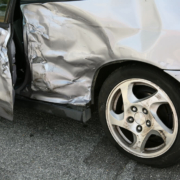What to Do If You are the Victim of a Hit and Run
Being involved in a hit-and-run accident can be a very unnerving experience. In addition to the injuries and property damage that you and your vehicle may have incurred, you may also be feeling angry, or have anxiety or fear about what will happen next. Indeed, without a driver against whom to file a claim, how you will pay for your damages may be up in the air. If you are hit by a driver who flees the scene, here’s what you need to know about what to do next.
- Report the Accident to the Police
The first thing that you should do if you are hit by a driver who does not remain at the scene of the accident is report the accident to the police, preferably within moments of its occurrence. Provide the responding police officer with as much information as you can about the accident, including any details you can remember about the other vehicle’s make, model, color, license plate number, and driver. The more information that you can provide to police, the more likely they will be able to apprehend the driver.
- Review Your Insurance Policy and File a Claim
If you are a driver in West Virginia, there is a very good chance that you carry car insurance; after all, it’s the law. Unfortunately, however, the type of car insurance that is required in West Virginia–property damage and bodily injury liability coverage–is designed to pay for damages that you cause to others in a crash, not damages that you incur as a result of other people’s actions. If the driver who hit you has gone missing, you will not be able to file a claim with their liability coverage.
However, uninsured/underinsured motorist coverage is also required in West Virginia, and this coverage type can help to pay for your losses in the event that the at-fault driver cannot be located (or is found but does not have insurance, or does not have enough insurance to pay for your losses). As such, if the driver at fault for your crash is a hit-and-runner, you can file a claim with your own insurance policy’s uninsured/underinsured coverage.
You may also be able to turn to your own policy if you carry other coverage types, such as collision coverage or medical payments coverage.
- Contact an Attorney
Ideally, you will not have to turn to your own insurance company because the hit-and-run driver will be located, and will carry enough insurance to pay for the total value of your losses. Either way, however, contacting a knowledgeable attorney who has experience finding hit-and-run drivers and negotiating hit-and-run claims with an insurance company is advised. Even if you have the coverage types listed above, your insurance company may not be eager to give you the compensation you deserve – it is the job of an insurance adjuster to save the insurance company as much money as possible. As such, the extent of your injuries and damages may be disputed, and having an attorney on your side who can rebut these claims and negotiate for a fair settlement significantly increases the chances of you recovering your maximum compensation award.
Contact Our West Virginia Car Accident Lawyers Today
At the law offices of Bailey, Javins, & Carter L.C., our West Virginia car accident lawyers know that being the victim of a hit and run opens the floodgates to dozens of questions and worries about how you will pay for your injuries. Our legal team has experience handling hit-and-run claims, and is here to advocate for you. To schedule a free consultation, please call us at 800-497-0234. You can also send us an email, or drop in our office if you’re in the area.



